Have you ever heard of FOMO – the syndrome known as the Fear of Missing Out? This is majorly the case in family dogs that can’t imagine life without people (or dogs) they love and are used to.
Take Taz, for example!
This pawdorable Pittie from New York just can’t stand being away for a second from his doggo sibling, the other Pittie named Bones.
With his clingy nature and just the silliest reaction whenever he’s apart from Bones, Taz is known to be “the baby of the family.” But, all that suddenly changed once an actual, hooman baby brother came along!
Taz – The Ultimate Doggo Baby
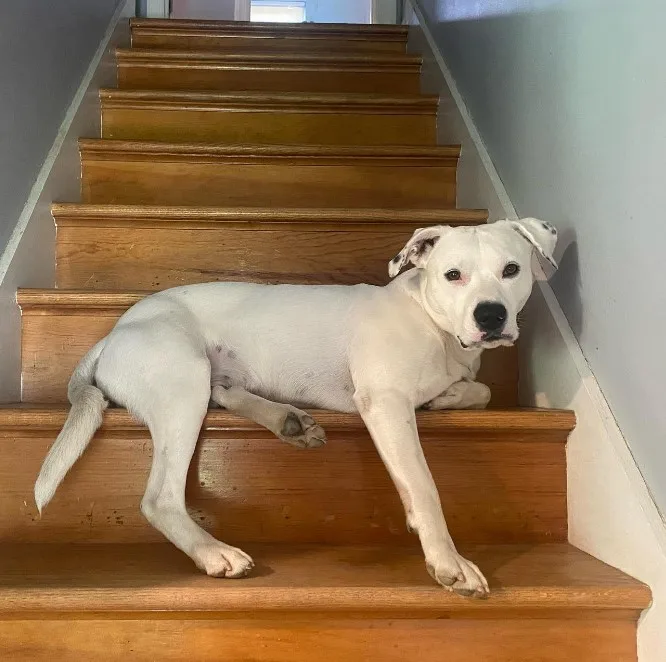
Taz has always been a special pup. He has the silliest, most playful soul and he definitely makes everyone laugh!
His owner, Jessica, is aware that sometimes Taz can be overly clingy, especially when she, her husband, or her mom pays too much attention to Bones.
Whenever grandma pets Bones or starts calling him sweet names, Taz is there to take the matter in his paws! He instantly starts cuddling to get everyone’s attention, as he’s just used to being everyone’s baby!
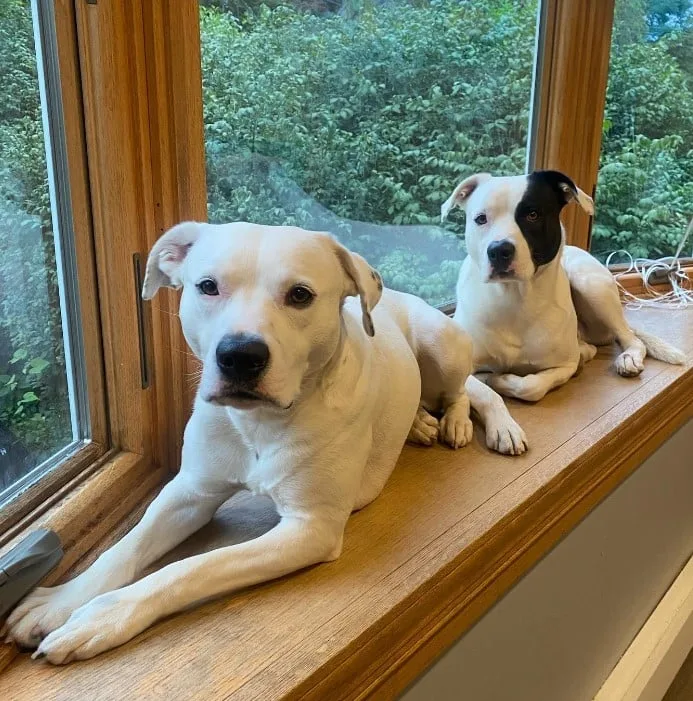
Or, when Bones is outside playing with his dad, Taz sits by the window or by the door the entire time, waiting for Bones to come inside. But, even though he’s sometimes set in his own ways, Taz’s silly character is hauntingly cute!
Recently, his mom and dad got a baby, and Jessica was a little skeptical about Taz being a big brother. She knew that he’s generally good with people, but she was afraid of his reaction to being “dethroned” as the baby of the family.
Adjusting To The ‘Big Brother Life’ Role
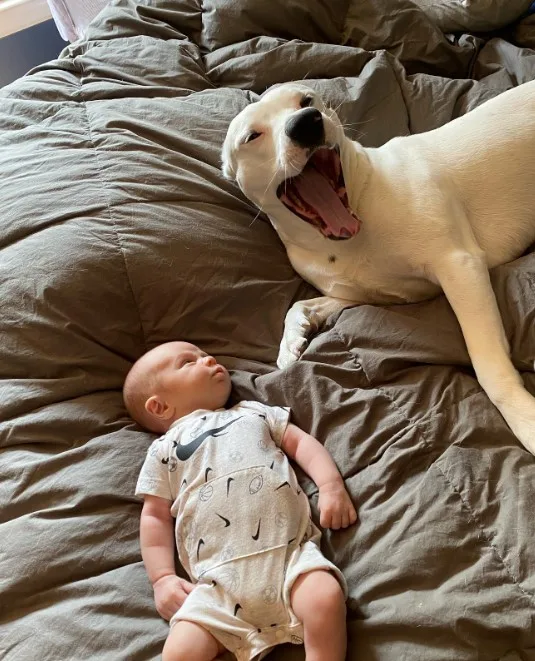
For the first several days, Taz was a little confused. He needed some time to realize that baby Ethan was a new member of the family. He would always look at him from a short distance, waiting for mom or dad to pay attention to him.
Bones, on the other hand, embraced Ethan immediately! He welcomed the baby boi with paws wide open, as if he was always a part of the family.
But, then it happened! It appears that it only took days for Taz to make peace with the fact that he’s not the only “baby” in their cozy, New York home.
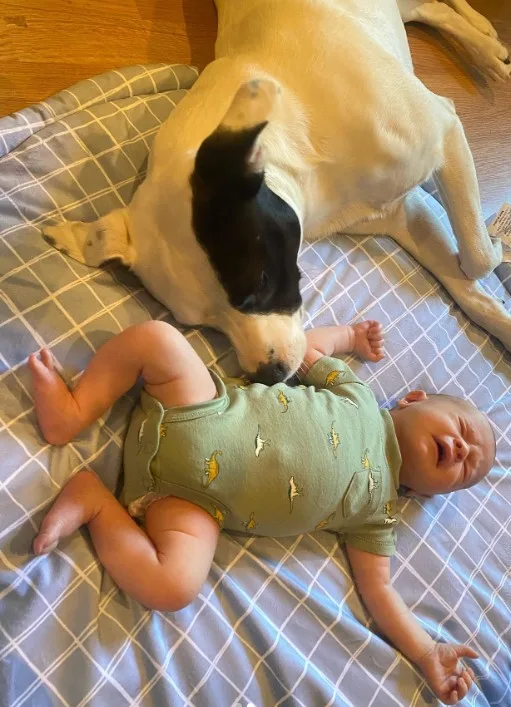
He soon embraced baby Ethan, too, and started behaving around him as a real big brother! He and Bones would lie next to his crib, protecting him.
And, whenever they get a chance, they sneak a little kiss on Ethan’s face, showing their baby brother how much they love him!
“Taz and Bones have been adjusting to baby Ethan so well and it makes me sooo happy. They’re honestly probably adjusting better than I am,” Jessica wrote on Instagram.
The Pawesome Trio
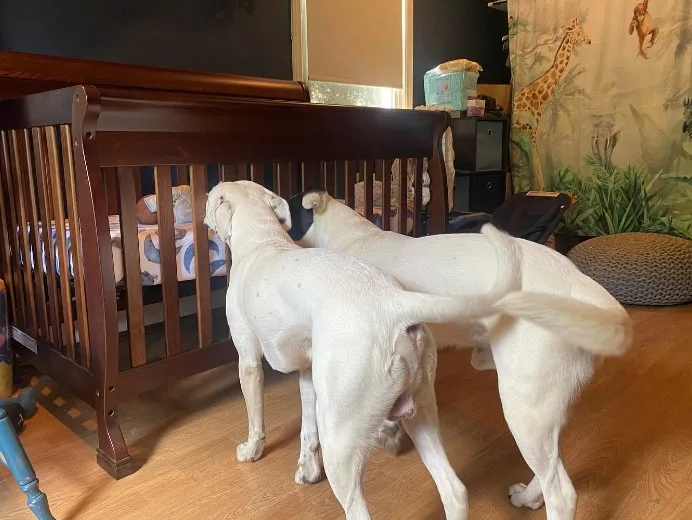
As time went by, Taz’s jealousy completely faded away. He embraced life with his two siblings with an open heart, balancing the love for both his baby hooman and Bones.
His owners are so happy to finally see Taz in the role of a big brother. After all the clingines he displayed over the years, it’s so grateful and refreshing to see him evolve into something new – something so positive!
“I know they’re going to be the best of friends once he’s older and can play with them but for now we’ll take all of the sweet, gentle “play” time we can get,” wrote Jessica.
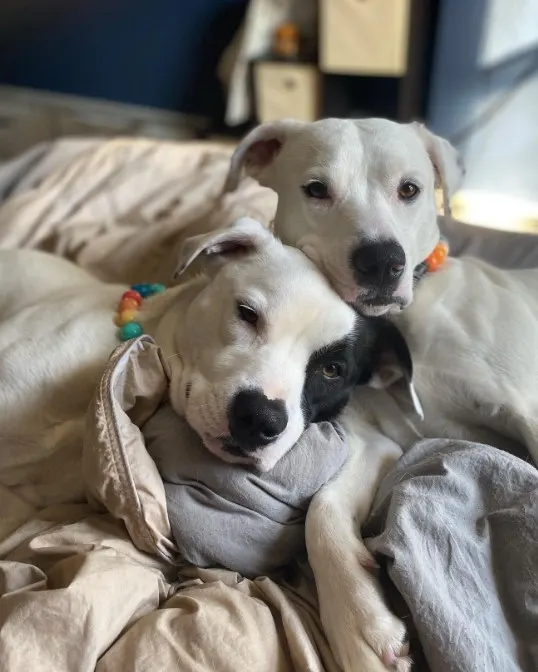
Even though they’re still “learning on the job,” one thing is for sure – both Taz and Bones will have tons of fun with Ethan once he grows up!
They’re both now in the “protective” mode, watching Ethan’s every step of the way. But, when the time comes – they will surely embark on many amazing adventures together!
You can keep up with Taz, Bones, and their beautiful family on Instagram and TikTok!
If you’ve ever been on the receiving end of a slobbery dog kiss, you might have wondered, “Why do dogs lick so much?” It’s a common behavior that our furry friends seem to thoroughly enjoy. From a quick swipe across your face to a full-on bath for your hands, dogs have their reasons for all that licking. Understanding this canine habit can give you a glimpse into their world and strengthen the bond between you and your four-legged companion.
Dogs use licking as a form of communication and expression, much like how we use words and gestures. It’s their way of showing affection, seeking attention, or even tasting and exploring their environment. So, the next time your dog showers you with licks, remember, it’s not just about cleaning or craving a salty snack – there’s a whole lot more to this endearing behavior.
Understanding Canine Behavior
The Language of Licking
When your dog licks you, it’s more than just a wet kiss. Dogs primarily lick as a way to communicate with you. It’s how they show affection, seek attention, or even ask for food. So, the next time your furry friend gives you a lick, remember that it’s their way of talking to you.
Psychological Factors Behind Licking
Dogs also lick due to several psychological reasons. It can be a soothing behavior, helping them calm down in stressful situations. Also, it might stem from puppyhood habits, like licking their mother for food. Understanding these psychological factors can give you insight into your dog’s behavior and strengthen your bond with them.
Different Reasons Why Dogs Lick
Affection and Bonding
When dogs lick you, it’s often a sign of love and attachment. They see you as part of their pack and licking is their way of showing affection towards you. It’s like giving you kisses to express their feelings and strengthen the bond between you and your furry friend.
Grooming and Cleanliness
Licking is a natural instinct for dogs to keep themselves clean. Just like cats, dogs use their tongues to groom their fur, especially in areas they can’t easily reach with their paws. By licking themselves, dogs remove dirt, debris, and even pests like fleas from their coat, maintaining good hygiene.
Exploring Their Environment
Dogs explore the world around them through their senses, including taste. Licking objects, surfaces, or even people is a way for them to gather information about their environment. It’s their way of learning about new scents, tastes, and textures, helping them understand and navigate the world they live in.
Seeking Attention or Communicating Needs
When your dog licks you persistently, they might be trying to get your attention or communicate their needs. It could be a way of asking for food, water, or even wanting to go outside. By licking you, dogs are trying to convey their desires and interact with you to fulfill their requirements.
Health-Related Causes of Licking
Licking to Relieve Discomfort
When your dog licks excessively in one area, it may be trying to alleviate discomfort such as pain, itchiness, or irritation. This behavior can signal skin allergies, insect bites, or even injuries. Keep an eye on any redness, swelling, or changes in the skin that may indicate an underlying issue requiring veterinary attention.
Indications of Underlying Health Issues
Persistent licking, especially of paws, can be a sign of health problems like skin infections, arthritis, or anxiety. If your dog is fixated on licking particular body parts, it could suggest pain, inflammation, or allergies. Regular veterinary check-ups are crucial to rule out any underlying health concerns triggering this behavior in your furry companion.
Licking Behavior in Different Situations
Licking Humans
When your dog licks you, it’s their way of showing affection and respect. Many dogs consider licking as a gesture of love and a means to bond with their human companions. This behavior mimics their actions with other dogs to strengthen social bonds. However, it’s essential to set boundaries to prevent overexcitement or issues related to personal space.
Licking Other Dogs or Animals
Dogs often lick other dogs or animals as a way of communicating and interacting. Licking between dogs can signal submission, friendliness, or even a desire to play. It’s a form of social behavior that helps maintain harmony within the pack. Pay attention to both dogs’ body language during these interactions to ensure it remains positive and respectful.
Licking Themselves Excessively
Excessive licking in dogs can indicate underlying issues that need attention. If your dog constantly licks themselves in one area, it could be a sign of discomfort or a health problem. Common reasons for excessive licking include pain, skin irritation, allergies, or stress. Monitoring your dog’s licking behavior and addressing any concerns promptly can help prevent potential health issues. Remember, if your dog’s licking becomes obsessive or leads to skin problems, consulting a vet is advisable.
Managing Excessive Licking
Training Tips to Reduce Licking
To curb your dog’s excessive licking behavior, start by redirecting their attention. When you catch them in the act, gently but firmly say “no” and offer them a suitable chew toy or treat. Positive reinforcement techniques work wonders. Praise them when they stop licking and engage in a different behavior. Consistency is key; ensure all family members interact with your dog consistently to reinforce the training.
When to Consult a Veterinarian
If your dog’s licking intensifies despite training efforts, it’s time to seek professional help. Persistent excessive licking can be a sign of underlying health issues or emotional distress. Visit your veterinarian to rule out any medical conditions causing the behavior. They can conduct a thorough examination and provide guidance on managing the licking problem. Remember, your vet is your best ally in ensuring your furry friend’s well-being.
Conclusion
That’s the scoop on why your furry friend can’t resist a good lick. Whether it’s to chat with you, show some love, or keep things clean, licking is their way of expressing themselves. Remember, excessive licking might mean something’s up, so keep an eye out for any unusual behavior. A quick trip to the vet could help rule out any underlying issues causing the constant licking. So, next time your pup showers you with slobbery kisses, know it’s all part of their unique way of communicating and bonding with you.
Frequently Asked Questions
Why do dogs lick?
Dogs lick for various reasons such as communication, affection, attention-seeking, and grooming instincts.
How can licking express love?
Licking is a way for dogs to show love, strengthen bonds, and effectively communicate their needs.
When should excessive licking be a concern?
Excessive licking should be a concern when it signals issues like pain, itchiness, or underlying health problems.
Why do dogs lick humans?
Dogs may lick humans to show affection and respect towards their owners.
How to manage excessive licking in dogs?
Managing excessive licking involves redirecting attention, using positive reinforcement, and seeking veterinary advice if the behavior persists.
[no_toc]

Hey there, I’m Janet Brooks, a dog-loving student from California. I’m all about helping pups in need, especially those without homes. Me and my awesome friends work together to give shelter and love to stray dogs. Oh, and I also write blogs about dogs to share helpful info.